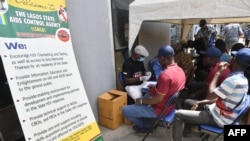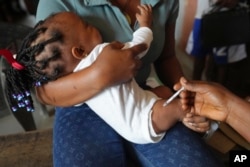Nigerian officials have launched a committee to develop a transition and sustainability plan for USAID-funded health programs following U.S. President Donald Trump’s 90-day halt of most foreign aid. The multi-ministerial committee aims to secure new financial support for critical health programs.
Nigeria’s health minister said the committee—comprising officials from the ministries of finance, health, and environment—intends to ensure that patients receiving treatment for HIV, tuberculosis, and malaria do not experience setbacks amid the uncertainty over U.S. foreign policy.
Shortly after taking office two weeks ago, U.S. President Donald Trump ordered a 90-day pause on U.S. foreign aid. But days later, he approved a temporary waiver for life-saving humanitarian assistance, covering medicine, medical services, food, and shelter.
Despite the exemption, concerns remain over the future of U.S. funding for global health programs.
Public health expert Ejike Orji welcomed Nigeria’s proactive response to the U.S. funding freeze.
"What this means is that they're going to do a review, situation assessment of what's going on and that would give them the opportunity to make recommendations to the government. They (U.S.) gave a ninety-day review because of the strategic importance of continuing the HIV program in Nigeria, so that means there's still a possibility after their review, they might say, ‘Look, we don't want to continue this funding," said Orji.
Nigeria is a significant recipient of U.S. foreign aid, receiving $1.02 billion in 2023, much of it through agencies like USAID.
USAID funding to Nigeria plays a pivotal role in HIV/AIDS treatment, maternal and child care, and disease prevention efforts.
On Monday, the Nigerian Federal Executive Council approved $1 billion for healthcare sector reforms and allocated an additional $3.2 million to procure 150,000 HIV treatment packs over the next four months.
Authorities said the new funding will support improvements in primary healthcare services, maternal and child healthcare, and training of healthcare professionals.
But Ndeayo Iwot, general secretary of the Health Sector Reforms Coalition, said it will be difficult to sustain those programs without continued U.S. support.
"Even when they're releasing the available funds on time, they will not be able to cover all the areas that those funds [aid] were helping them to achieve. It will take time, probably two, three years," said Iwot.
Approximately 1.8 million Nigerians are living with HIV. The country also accounts for the world's highest number of malaria deaths and ranks among the top countries for tuberculosis cases.
Iwot said Nigeria needs new partnerships for health programs.
"Health needs a multi sectoral approach, it works on partnerships, there are certain things you shouldn't do alone as a country. Going through resource pulling from many partners and stakeholders is a recommended approach to financing health activities,” said Iwot.
Currently, only about 4% of Nigeria’s annual budget is allocated to the health sector—far below the 15 percent target set by African leaders in the 2001 Abuja Declaration.
It's unclear whether the U.S. will reverse its decision after the 90-day pause. But with uncertainty looming, analysts say careful implementation of policies and new partnerships may be Nigeria’s best path forward.

